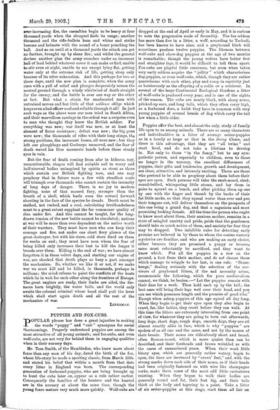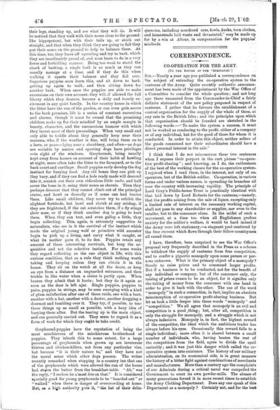PUPPIES AND FOX-CUBS.
POPULAR phrase has done a great injustice in making the words " puppy" and " cub " synonyms for social shortcomings. Properly understood puppies are among the most attractive of all young animals;- and fox-cubs, and even wolf-cubs, are not very far behind them in engaging qualities when in their nursery days.
Mr. Tom Smith, of the Hambledon, who knew more about foxes than any man of his day, dated the birth of the fox, whose life-story be made a sporting classic, from March 25th, and stated his belief that within a month from that date every litter in England was born. The corresponding generation of foxhound-puppies, who are being brought up to hunt the cubs later on, appear as a rule rather earlier. Consequently the families of the hunters and the hunted are in the nursery at about the same time, though the young foxes mature very much more quickly. - Wolf-cubs are
dropped at the end of April or early in May, and it is curious to note the progressive scale of fecundity. The fox seldom has more than five in a litter, a wolf, according to Tachudi, has been known to have nine, and a greyhound bitch will sometimes produce twelve puppies. The likeness between wolf-cubs and chow-dog puppies at the age of two months is remarkable; though the young wolves have better feet and straighter legs, it would be difficult to tell them apart. Fox-cubs are playful little creatures, but even when taken very early seldom acquire the " jollity " which characterises dog-puppies, or even wolf-cubs, which, though they are rather quarrelsome with each other, play and romp in captivity just as boisterously as the offspring of a collie or a retriever. In several of the large Continental Zoological Gardens a litter of wolf-cubs is produced every year, and is one of the sights of the season. The cubs are nearly black, with sharp noses, pricked-up ears, and long tails, which they often carry high, as a foxhound does, a habit they have in common with very young puppies of several breeds of dog which carry the tail low when a little older.
Puppies offer the best, and almost the only, study of family life open to us among animals. There are as many characters and individualities in a litter of average setter-puppies as in a family as large as that in the Daisy Chain, and there is this advantage, that they are " all twins " and start level, and do not take a lifetime to develop in. Not only to those " in the fancy," but to any sym- pathetic person, and especially to children, even to those no longer in the nursery, the excellent differences of puppies, their gifts and tendencies, growth and development, are clear, attractive, and intensely exciting. There are those who pretend to be able to prophesy about them before their eyes are open. Such persons will take the snub-nosed, sleek, round-bellied, whimpering little atoms, and lay them in pairs to sprawl on a bench, and after picking them up one by one with the finger and thumb by the backs of their fat little necks, so that they squeal worse than ever and put their tongues out, will deliver themselves on the prospects of this one being a grand dog, and that a sagacious and most promising looking female. All the time the person who ought to know most about them, their anxious mother, remains in a state of mingled anxiety and pride, pride that the gentlemen should take so much notice of them, and anxiety for fear they may be dropped. Two infallible rules for detecting early promise are believed in by those to whom the canine nursery mysteries are familiar, and who are making an early choice, either because they are promised a puppy or because some must reluctantly be sacrificed, and they want to know which. Put all the puppies in a row on the ground, a foot from their mother, and do not choose those which manage to wriggle to her last, is one rule. " Stone- henge," dealing seriously with the selection of the sur- vivors of greyhound litters, if the sad necessity arises, recommends the following, which for pure medirevalism cannot, we think, be beaten:—" Let the puppies remain with their dam for a week. Then hold each up by the tail ; the best ones will bring their legs well over their head, and you can see which. possesses length and the promise of good ribs.' Except when asleep puppies of this age squeal all day long. When they begin to get their eyes open they also begin to crawl, for, like babies, they crawl before they can walk. At this time the litters are extremely interesting from one point of vie' w, for whatever they are going to turn out afterwards, long dogs, short dogs, rough dogs, smooth doge, they are all almost exactly alike in face, which is why " puppies " are spoken of as all one and the same, and not by the names of their breeds. Their noses are ridiculously short and broad, often Roman-nosed, which is more quaint than can be described, and their foreheads and brows wrinkled as with the cares of unnumbered years. When their weak little bleary eyes, which are generally rather watery, begin to open, the lines are increased by " crows' feet," and, with the strong marks down each side of their noses, as if their heads had been originally fastened on with wire like champagne corks, make them some of the most odd little caricatures existing. When they begun to walk their bodies are generally round and fat, their feet big, and their tails thick at the body and tapering to a point. Take a litter of six setter-puppies at this stage, start them all fair on their legs, standing up, and see what they will do. It will be noticed that they walk with their noses close to the grounds like hippopotami, but with their tails up, or stuck out straight, and that when they think they are going to fall they put their noses on the ground to help to balance them. At this time, too, they leave off squealing and try to bark, which they are inordinately proud of, and soon learn to do in a very fierce and forbidding manner. Being too weak to stand the shock of barking, a single bark is as much as they can usually manage at a time, and if they do this when walking it upsets their balance and they fall over. Sagacious puppies soon learn this, and sit down to bark, getting up again to walk, and then sitting down for another bark. When once the puppies are able to make excursions on their own account, they will, if allowed the full liberty which they deserve, become a daily and hourly ex- citement in any quiet family. In the country house in which the litter have the run of the garden, or can even gain access to the back premises, life is a series of constant excursions and alarms, though it must be owned that the promising children make up for their mischief by an ample margin in beauty, character, and the unconscious humour with which they invest most of their proceedings. When very small and only able to toddle about they generally keep near their mamma, who, if the weather is fine, will bring them on to a lawn, or grass-edging near a shrubbery, and often—as dogs are sociable by nature and sporting dogs have privileges —in sight of the windows. Greyhounds, being usually kept away from houses on account of their habit of howling at night, more often take the litter to the farmyard, or to the back court and curtilage. Small puppies early develop the dog instinct for burying food. Any old bones they can pick up they bury, and if they can find a hole ready made will descend into it, scratch out their own ridiculous little cache, and half cover the bone in it, using their noses as shovels. Then they perhaps discover that they cannot climb out of the principal crater, and howl as dismally as if some one had beaten them. Like small children, they never try to exhibit the slightest fortitude, but howl and shriek at any mishap, if they are frightened, if the cat scratches them, if a fly stings their nose, or if they think another dog is going to hurt them. When they can trot, and even gallop a little, they begin collecting. This, again, is extremely suggestive to naturalists, who see in it the survival of the instinct which made the original young wolf or primitive wild ancestor begin to pick up a living, and carry what it caught, or what its mother gave it, to its den. Puppies retain any amount of these interesting survivals, but keep the ac- quisitive and not the selective instinct. For some weeks they regard collecting as the one object in life, with this curious condition, that as a rule they think nothing worth taking and keeping unless they can obtain it in the house. They sit on the watch at all the doors, or keep an eye from a distance on unguarded entrances, and then trickle in like water when a sluice is partly open. When beaten they admit that it hurts ; but they do it again as soon as the door is left ajar. Single puppies, puppies in pairs, puppies in strings, may be seen emerging with a kind of glum satisfaction after one of these raids, one with a boot, another with a bat, another with a duster, another dragging a doormat and tumbling over it. They try, if possible, to tear these things up as small as possible, with a hazy idea of burying them after. But the tearing up is the main object, and one generally carried out. They seem to regard it as a form of work for which they ought to take credit.
Greyhound-puppies have the reputation of being the most mischievous of the mischievous brotherhood of puppies. They inherit this to some extent, for a large percentage of greyhounds when grown up are inveterate thieves and chicken-killers, not from any particular vice, but because " it is their nature to," and they have not the moral sense which other dogs possess. The writer recently remarked when stopping in a country inn that one of the greyhounds which were allowed the run of the house had stolen the butter from the breakfast-table. " Ah," was the reply, " I reckon he a'most live on that." It is considered specially good for young greyhounds to be " boarded out " or "walked" when there is danger of overcrowding at home. But, as a high authority puts it, "the list of their delin- quencies, including murdered cats, fowls, ducks, torn clothes, and homesteads laid waste and devastated," may be made up for by a win at Altair, in compensation for the puppies'. misdeeds.







































 Previous page
Previous page